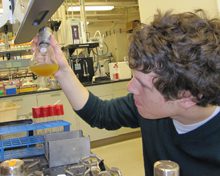Timothy Roth L&S Sciences
The use of modular, synthetic scaffolds for modeling pathway kinetics using a synthetic n-butanol pathway in engineered E. coli
The current energy crisis in the US has demanded the production of alternative, renewable fuels to replace our current petroleum-based fuels. However, the limitations of the current biofuel standard, ethanol, require the development of second-generation fuels that can be used with existing engines and infrastructure. One such fuel is n-butanol, which the M. Chang group has successfully produced at good yield using a synthetic metabolic pathway engineered into E. coli. The Dueber Lab has demonstrated that synthetic protein scaffolds can be used to colocalize enzymes in metabolic pathways in varying ratios and thus optimize the flux through these pathways and improve production. By observing the effects of such scaffolds on the M. Chang group’s synthetic butanol pathway in E. coli, I can gain a more complete picture of the overall flux through the pathway, allowing for further increases in both butanol production efficiency and our understanding of cellular enzymology.
Message To Sponsor
This SURF fellowship gives me valuable experience in the kinds of research and lab work that I plan to continue doing after graduating from Berkeley, as well as giving me substantial data for a senior honors thesis and eventual publication in a scientific journal. More importantly, though, it allows me to contribute to a field of research that I am passionate about. I care greatly about developing alternative energy sources, and SURF gives me a chance to contribute to this effort.